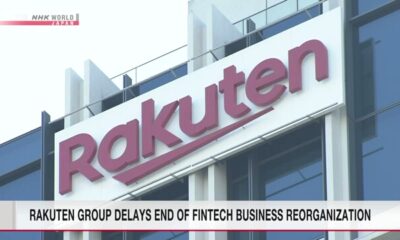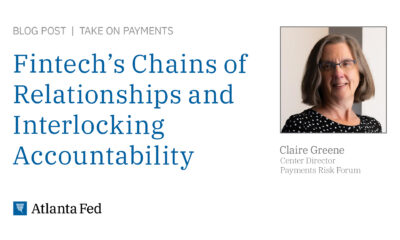Fintech
Thredd’s McCarthy is dedicated to the financial technology business

Defining “payments modernization” is no easy task.
If you asked 10 different payment processors to define it, you might get 10 different answers.
But for the payment processor Thredd CEO Jim McCarthy, payments modernization is a core mission and not an abstract concept. As he told PYMNTS for the “What’s Next In Payments” series, modernization is about adaptability and flexibility, which are key to staying ahead of the curve in a competitive market.
“Being modern means having the flexibility and adaptability to react in almost real time,” he said, setting the tone for a discussion that spans the complexities of being a FinTech company: risk management; enabling technologies; international expansion; and the importance of partnerships.
For McCarthy and Thredd, being a FinTech company in today’s market means more than simply keeping up with technological advances. It’s about embodying an inherently flexible and adaptable mindset. McCarthy emphasized that Thredd’s mission is to remain agile, a characteristic that has allowed the company to navigate the tumultuous regulatory landscapes of new markets, particularly in its recent expansion into the United States.
“You look for things that are, in my mind, universal truths,” he said. “Payments are about risk management, compliance, reconciliation and all these things. The things we don’t talk about because we all like to focus on user experience and user interface. But it’s the plumbing that’s most interesting to me. Those who do it well and do it compliantly and safely, that’s where the focus needs to be.”
This ability to pivot quickly, establishing new relationships and partnerships, is central to Thredd’s strategy, allowing the company to offer its clients seamless entry into complex markets. McCarthy said this adaptability isn’t just a competitive advantage; it is a necessity.
No charm
The importance of compliance, such as anti-money laundering (AML) and know your customer (KYC), cannot be overstated, especially in a landscape fraught with regulatory scrutiny, McCarthy said.
“AML and KYC have been with us for a long time and it needs to be done,” he said. “It’s a quick way to shut down a program if you’re not doing these things. So, I think focusing on the less attractive aspects of FinTech is the whole point.”
Thredd positions itself as a facilitator for its clients, particularly those looking to expand into new markets. McCarthy highlighted the company’s role in providing reliable and compliant payment capabilities, allowing customers to focus on their core competencies.
“We want to be the best platform so they can move easily, in a compliant way,” he said.
This focus on supporting customers extends to supporting multiple payment types, including the increasingly popular debit transactions.
“To play with debit, you have to be Durbin compliant,” McCarthy said, referring to the Durbin Amendment, a regulation that affects debit card transaction fees in the United States. By ensuring compliance, Thredd enables clients to take advantage of new opportunities without the burden of regulatory concerns.
“My goal is to build compliant, easy-to-use and reliable payment capabilities so they can move on and focus on what they do well, which is often a software vertical, whether that’s travel, serving consumers or making payments” , he has declared. she said. “They can then focus on the user interface, the UX – and all these things are important – and the added value they have without having to worry is that their payment partner is reliable, secure and compliant. So, that’s the combination: letting them sleep well at night while they focus on growing their business.”
International expansion
Geographic growth remains a significant driver for Thredd, McCarthy said. The Internet is a tool that has made the world “relatively flat”, despite various regulatory regimes. Thredd aims to facilitate international expansion for its customers.
“We see our role as an enabler and the movement of customers around the world into new markets as a significant differentiator for us,” McCarthy said.
Latin America, Asia and now the United States are the key markets Thredd is focusing its efforts on. The company believes these regions are ripe for innovation and growth, using its adaptable platform to support clients’ global ambitions.
“Latin America is a big market that is growing dramatically,” he said. “We want to be there. We’re doing very well in Asia, and we’re about to land in the United States and look to expand.”
Partnerships and collaborations
In the interconnected world of FinTech, partnerships and collaborations are essential. McCarthy pointed ApplePay as the first example of successful collaboration, where Apple has worked with US banks and networks such as Visa AND MasterCard to create an innovative payment solution.
“The industry is about collaboration,” McCarthy said. “Apple opened up the devices, put NFC chips in the devices, and partnered with U.S. banks along with Visa and Mastercard to create what is now Apple Pay. And I just saw a report today. It is definitely one of the most successful payment inventions of my life. These things happened collaboratively. This prompted Visa and Mastercard to create tokens, which have become central to much of the discussion for both networks.”
Initiatives like the anti-fraud consortium driven by Half exemplify the industry’s movement towards stronger partnerships to combat emerging threats.
He said the missing element in the fight against fraud is efficient information sharing across the payments ecosystem, “particularly around identity and account theft. This will require a degree of cooperation that we have never seen before, to share information because that is the only way to stop this.”
Looking to the future: opportunities and innovations
As Thredd looks to the future, geographic expansion remains a top priority. McCarthy identified Latin America as a growing market and expressed interest in disrupting consumer credit.
“Consumer lending is an area ripe for disruption,” he said, pointing to Thredd’s commitment to exploring new avenues for growth.
The continued advancements of major networks like Visa and Mastercard also keep the industry dynamic. McCarthy said he anticipates announcements from upcoming forums, confident that they will bring further innovation.
“There’s always something around the corner,” he said.
See more in: anti-money laundering, credit, charge, News Featured, FinTech, Fraud prevention, Jim McCarthy, KYC, MasterCard, News, partnerships, Payments modernization, payments, PIMNTI news, Pymnts TV, Thredd, Visa, What’s next in the Payments series, The Future of Payments: Payments Modernization 2024
Fintech
US Agencies Request Information on Bank-Fintech Dealings

Federal banking regulators have issued a statement reminding banks of the potential risks associated with third-party arrangements to provide bank deposit products and services.
The agencies support responsible innovation and banks that engage in these arrangements in a safe and fair manner and in compliance with applicable law. While these arrangements may offer benefits, supervisory experience has identified a number of safety and soundness, compliance, and consumer concerns with the management of these arrangements. The statement details potential risks and provides examples of effective risk management practices for these arrangements. Additionally, the statement reminds banks of existing legal requirements, guidance, and related resources and provides insights that the agencies have gained through their oversight. The statement does not establish new supervisory expectations.
Separately, the agencies requested additional information on a broad range of arrangements between banks and fintechs, including for deposit, payment, and lending products and services. The agencies are seeking input on the nature and implications of arrangements between banks and fintechs and effective risk management practices.
The agencies are considering whether to take additional steps to ensure that banks effectively manage the risks associated with these different types of arrangements.
SUBSCRIBE TO THE NEWSLETTER
And get exclusive articles on the stock markets
Fintech
What changes in financial regulation have impacted the development of financial technology?

Exploring the complex landscape of global financial regulation, we gather insights from leading fintech leaders, including CEOs and finance experts. From the game-changing impact of PSD2 to the significant role of GDPR in data security, explore the four key regulatory changes that have reshaped fintech development, answering the question: “What changes in financial regulation have impacted fintech development?”
- PSD2 revolutionizes access to financial technology
- GDPR Improves Fintech Data Privacy
- Regulatory Sandboxes Drive Fintech Innovation
- GDPR Impacts Fintech Data Security
PSD2 revolutionizes access to financial technology
When it comes to regulatory impact on fintech development, nothing comes close to PSD2. This EU regulation has created a new level playing field for market players of all sizes, from fintech startups to established banks. It has had a ripple effect on other markets around the world, inspiring similar regulatory frameworks and driving global innovation in fintech.
The Payment Services Directive (PSD2), the EU law in force since 2018, has revolutionized the fintech industry by requiring banks to provide third-party payment providers (TPPs) with access to payment services and customer account information via open APIs. This has democratized access to financial data, fostering the development of personalized financial instruments and seamless payment solutions. Advanced security measures such as Strong Customer Authentication (SCA) have increased consumer trust, pushing both fintech companies and traditional banks to innovate and collaborate more effectively, resulting in a dynamic and consumer-friendly financial ecosystem.
The impact of PSD2 has extended beyond the EU, inspiring similar regulations around the world. Countries such as the UK, Australia and Canada have launched their own open banking initiatives, spurred by the benefits seen in the EU. PSD2 has highlighted the benefits of open banking, also prompting US financial institutions and fintech companies to explore similar initiatives voluntarily.
This has led to a global wave of fintech innovation, with financial institutions and fintech companies offering more integrated, personalized and secure services. The EU’s leadership in open banking through PSD2 has set a global standard, promoting regulatory harmonization and fostering an interconnected and innovative global financial ecosystem.
Looking ahead, the EU’s PSD3 proposals and Financial Data Access (FIDA) regulations promise to further advance open banking. PSD3 aims to refine and build on PSD2, with a focus on improving transaction security, fraud prevention, and integration between banks and TPPs. FIDA will expand data sharing beyond payment accounts to include areas such as insurance and investments, paving the way for more comprehensive financial products and services.
These developments are set to further enhance connectivity, efficiency and innovation in financial services, cementing open banking as a key component of the global financial infrastructure.
General Manager, Technology and Product Consultant Fintech, Insurtech, Miquido
GDPR Improves Fintech Data Privacy
Privacy and data protection have been taken to another level by the General Data Protection Regulation (GDPR), forcing fintech companies to tighten their data management. In compliance with the GDPR, organizations must ensure that personal data is processed fairly, transparently, and securely.
This has led to increased innovation in fintech towards technologies such as encryption and anonymization for data protection. GDPR was described as a top priority in the data protection strategies of 92% of US-based companies surveyed by PwC.
Financial Expert, Sterlinx Global
Regulatory Sandboxes Drive Fintech Innovation
Since the UK’s Financial Conduct Authority (FCA) pioneered sandbox regulatory frameworks in 2016 to enable fintech startups to explore new products and services, similar frameworks have been introduced in other countries.
This has reduced the “crippling effect on innovation” caused by a “one size fits all” regulatory approach, which would also require machines to be built to complete regulatory compliance before any testing. Successful applications within sandboxes give regulators the confidence to move forward and address gaps in laws, regulations, or supervisory approaches. This has led to widespread adoption of new technologies and business models and helped channel private sector dynamism, while keeping consumers protected and imposing appropriate regulatory requirements.
Co-founder, UK Linkology
GDPR Impacts Fintech Data Security
A big change in financial regulations that has had a real impact on fintech is the 2018 EU General Data Protection Regulation (GDPR). I have seen how GDPR has pushed us to focus more on user privacy and data security.
GDPR means we have to handle personal data much more carefully. At Leverage, we have had to step up our game to meet these new rules. We have improved our data encryption and started doing regular security audits. It was a little tricky at first, but it has made our systems much more secure.
For example, we’ve added features that give users more control over their data, like simple consent tools and clear privacy notices. These changes have helped us comply with GDPR and made our customers feel more confident in how we handle their information.
I believe that GDPR has made fintech companies, including us at Leverage, more transparent and secure. It has helped build trust with our users, showing them that we take data protection seriously.
CEO & Co-Founder, Leverage Planning
Related Articles
Fintech
M2P Fintech About to Raise $80M

Application Programming Interface (API) Infrastructure Platform M2P Financial Technology has reached the final round to raise $80 million, at a valuation of $900 million.
Specifically, M2P Fintech, formerly known as Yap, is closing a new funding round involving new and existing investors, according to entrackr.com. The India-based company, which last raised funding two and a half years ago, previously secured $56 million in a round led by Insight Partners, earning a post-money valuation of $650 million.
A source indicated that M2P Fintech is ready to raise $80 million in this new funding round, led by a new investor. Existing backers, including Insight Partners, are also expected to participate. The new funding is expected to go toward enhancing the company’s technology infrastructure and driving growth in domestic and international markets.
What does M2P Fintech do?
M2P Fintech’s API platform enables businesses to provide branded financial services through partnerships with fintech companies while maintaining regulatory compliance. In addition to its operations in India, the company is active in Nepal, UAE, Australia, New Zealand, Philippines, Bahrain, Egypt, and many other countries.
Another source revealed that M2P Fintech’s valuation in this funding round is expected to be between USD 880 million and USD 900 million (post-money). The company has reportedly received a term sheet and the deal is expected to be publicly announced soon. The Tiger Global-backed company has acquired six companies to date, including Goals101, Syntizen, and BSG ITSOFT, to enhance its service offerings.
According to TheKredible, Beenext is the company’s largest shareholder with over 13% ownership, while the co-founders collectively own 34% of the company. Although M2P Fintech has yet to release its FY24 financials, it has reported a significant increase in operating revenue. However, this growth has also been accompanied by a substantial increase in losses.
Fintech
Scottish financial technology firm Aveni secures £11m to expand AI offering

By Gloria Methri
Today
- To come
- Aveni Assistance
- Aveni Detection
Artificial intelligence Financial Technology Aveni has announced one of the largest Series A investments in a Scottish company this year, amounting to £11 million. The investment is led by Puma Private Equity with participation from Par Equity, Lloyds Banking Group and Nationwide.
Aveni combines AI expertise with extensive financial services experience to create large language models (LLMs) and AI products designed specifically for the financial services industry. It is trusted by some of the UK’s leading financial services firms. It has seen significant business growth over the past two years through its conformity and productivity solutions, Aveni Detect and Aveni Assist.
This investment will enable Aveni to build on the success of its existing products, further consolidate its presence in the sector and introduce advanced technologies through FinLLM, a large-scale language model specifically for financial services.
FinLLM is being developed in partnership with new investors Lloyds Banking Group and Nationwide. It is a large, industry-aligned language model that aims to set the standard for transparent, responsible and ethical adoption of generative AI in UK financial services.
Following the investment, the team developing the FinLLM will be based at the Edinburgh Futures Institute, in a state-of-the-art facility.
Joseph Twigg, CEO of Aveniexplained, “The financial services industry doesn’t need AI models that can quote Shakespeare; it needs AI models that deliver transparency, trust, and most importantly, fairness. The way to achieve this is to develop small, highly tuned language models, trained on financial services data, and reviewed by financial services experts for specific financial services use cases. Generative AI is the most significant technological evolution of our generation, and we are in the early stages of adoption. This represents a significant opportunity for Aveni and our partners. The goal with FinLLM is to set a new standard for the controlled, responsible, and ethical adoption of generative AI, outperforming all other generic models in our select financial services use cases.”
Previous Article
Network International and Biz2X Sign Partnership for SME Financing
IBSi Daily News Analysis

SMBs Leverage Cloud to Gain Competitive Advantage, Study Shows
IBSi FinTech Magazine

- The Most Trusted FinTech Magazine Since 1991
- Digital monthly issue
- Over 60 pages of research, analysis, interviews, opinions and rankings
- Global coverage
subscribe now
-

 DeFi12 months ago
DeFi12 months agoDeFi Technologies Appoints Andrew Forson to Board of Directors
-

 Fintech12 months ago
Fintech12 months agoUS Agencies Request Information on Bank-Fintech Dealings
-

 News1 year ago
News1 year agoBlock Investors Need More to Assess Crypto Unit’s Earnings Potential, Analysts Say — TradingView News
-

 DeFi12 months ago
DeFi12 months agoSwitchboard Revolutionizes DeFi with New Oracle Aggregator
-

 DeFi12 months ago
DeFi12 months agoIs Zypto Wallet a Reliable Choice for DeFi Users?
-

 News1 year ago
News1 year agoBitcoin and Technology Correlation Collapses Due to Excess Supply
-

 Fintech12 months ago
Fintech12 months agoWhat changes in financial regulation have impacted the development of financial technology?
-

 Fintech12 months ago
Fintech12 months agoScottish financial technology firm Aveni secures £11m to expand AI offering
-

 Fintech12 months ago
Fintech12 months agoScottish financial technology firm Aveni raises £11m to develop custom AI model for financial services
-

 News1 year ago
News1 year agoValueZone launches new tools to maximize earnings during the ongoing crypto summer
-

 Videos5 months ago
Videos5 months ago“Artificial intelligence is bringing us to a future that we may not survive” – Sco to Whitney Webb’s Waorting!
-

 DeFi1 year ago
DeFi1 year agoTON Network Surpasses $200M TVL, Boosted by Open League and DeFi Growth ⋆ ZyCrypto


















